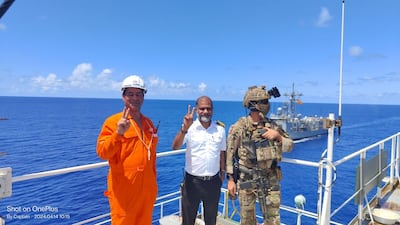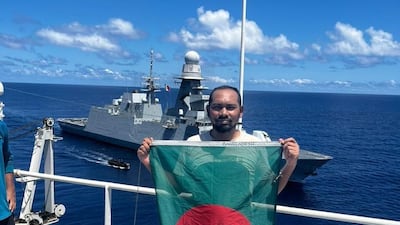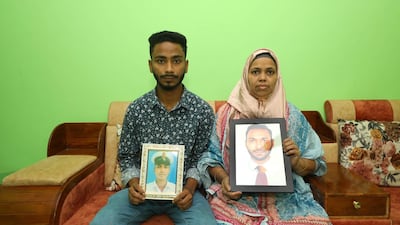Bangladeshi sailors taken hostage by Somali pirates have spoken to their families for the first time since their cargo vessel was seized last week.
Somali pirates hijacked the Bangladesh-flagged MV Abdullah that was carrying coal from Maputo, Mozambique to Al Hamriya port, UAE, with 22 crew on board on March 12.
Relatives have described the terror and psychological trauma the men are experiencing with Somali pirates wielding AK-47 assault rifles on board.
They have also raised concerns of dwindling supplies of fresh water and food as the ship was scheduled to reach the Emirates earlier this week.
Every day we are scared something will happen to him
Mainul Hoque about his brother Ainul Hoque,
among 22 Bangladeshi hostages being held by Somali pirates
The ship owners, SR Shipping Lines, confirmed the men were safe and all efforts were being made for the return of the crew and vessel.
“My brother is very nervous, they are all scared, their water will be finished very soon and if the food gets over - they are worried,” Mainul Hoque told The National from Chittagong, after the family spoke to his brother Ainul Hoque who is among the hostages.
“He said, ‘What will happen when the food gets over, what will we eat and drink?'”
The pirates demanded the crew give up phones and electronic devices and after several days permitted them a few minutes to speak to their families on the ship's satellite phone
Mainul's 30-year-old brother, an engineer, has been a seafarer since 2016 and the family are terrified of the danger he is in.
“My mother told my brother, ‘Be strong, you will come back to us very soon’," he said
“The pirates are not yet trying to hurt them but we can’t sleep because of the tension.
“Every day we are scared something will happen to him.”
Rescue efforts continue
A group of about 15 to 20 pirates took control of the ship carrying 55,000 tonnes of coal when it was about 500 nautical miles away from the Somali coast last week.
At gunpoint, the pirates forced the crew to sail to Somalia.
Meherul Karim, chief executive of SR Shipping, which is part of the Bangladesh-based KSRM Group, confirmed the crew were safe, but declined to speak about negotiations with the pirates.
“The crew are in good health, they are calling their families and we are in contact with the families,” Mr Karim said.
“The pirates allowed them to use the ship’s satellite phone to call their families."
When asked about the company’s communication with the pirates, he said, “Everything is being done to get the ship released without any injury and application of force.
“We are doing everything possible to get the vessel out as early as possible.”
This is the second time that a vessel owned by the group has been hijacked by Somali pirates.
In March 2011, pirates released 26 hostages from the MV Jahan Moni after 100 days in captivity.
Mr Karim was part of the team that negotiated the release of the crew more than a decade ago.
“We are in a team and working together,” he said.
“We will use all the experience we have to bring the men home safe.”
'How can we eat when my son is not getting food'
The family of Mohammed Atikullah, the ship’s 35-year-old chief officer, said they were relieved to speak to him but were anxious about the crew’s mental wellbeing.
“My brother said ‘just pray for us’,” Mohammad Asif, his younger brother, told The National from Chittagong.
He said they were fine and there was no need to worry.
"He tried to make us feel better," Mr Asif said.
“After the call, we felt a bit of relief. Before that, we were in panic mode every day.
“Even though he told us they [pirates] didn’t harm them, I know that mentally they are not well.
The pirates had machine guns, AK-47s, and other heavy weapons, Mr Asif said.
“All crew are in one room, the bridge room, at night but they are not sleeping well," he added.
“We want them to get back safe soon.”
The thought of their loved one on a ship with gunmen had shaken his wife and young children and mother.
“We are going through very hard times, my mother is crying every day,” Mr Asif said.
“She says my son is not getting food properly, how can we eat.”
Several hijacking attempts off the Somali coast since December have triggered concern about a resurgence of piracy.
This coincides with a surge in attacks by Yemen’s Houthi rebels targeting merchant ships passing through the Red Sea in retaliation against the military operation by Israel in Gaza.
Naval forces from multiple nations have stepped up patrolling following a rise in piracy and drone attacks in the Gulf of Aden, Red Sea, Arabian Sea and the Indian Ocean.
In the case of MV Abdullah, the Indian Navy said it responded to an SOS call from the cargo ship and had deployed a patrol aircraft.
An Indian warship tried to establish communication with the crew but did not receive a response and stayed with the vessel until it entered Somali waters.
In a separate incident, the Indian navy rescued 17 crew and took control of Maltese-flagged bulk carrier MV Ruen on March 16.
The navy said all 35 pirates surrendered marking the end of the takeover of the Bulgarian-owned vessel that was hijacked in December 2023 – the first time since 2017 that any cargo vessel was successfully boarded by Somali pirates.
Somali gunmen caused fear in the maritime world when attacks peaked in 2011 and pirates took dozens of crew hostage and demanded millions of dollars in ransom.
Piracy incidents fell sharply in recent years after the international naval presence was expanded in high-risk areas off the Somali coast.
Anti-semitic attacks
The annual report by the Community Security Trust, which advises the Jewish community on security , warned on Thursday that anti-Semitic incidents in Britain had reached a record high.
It found there had been 2,255 anti-Semitic incidents reported in 2021, a rise of 34 per cent from the previous year.
The report detailed the convictions of a number of people for anti-Semitic crimes, including one man who was jailed for setting up a neo-Nazi group which had encouraged “the eradication of Jewish people” and another who had posted anti-Semitic homemade videos on social media.
Living in...
This article is part of a guide on where to live in the UAE. Our reporters will profile some of the country’s most desirable districts, provide an estimate of rental prices and introduce you to some of the residents who call each area home.
EA Sports FC 25
Developer: EA Vancouver, EA Romania
Publisher: EA Sports
Consoles: Nintendo Switch, PlayStation 4&5, Xbox One and Xbox Series X/S
Rating: 3.5/5
The Details
Kabir Singh
Produced by: Cinestaan Studios, T-Series
Directed by: Sandeep Reddy Vanga
Starring: Shahid Kapoor, Kiara Advani, Suresh Oberoi, Soham Majumdar, Arjun Pahwa
Rating: 2.5/5
UPI facts
More than 2.2 million Indian tourists arrived in UAE in 2023
More than 3.5 million Indians reside in UAE
Indian tourists can make purchases in UAE using rupee accounts in India through QR-code-based UPI real-time payment systems
Indian residents in UAE can use their non-resident NRO and NRE accounts held in Indian banks linked to a UAE mobile number for UPI transactions
The Limehouse Golem
Director: Juan Carlos Medina
Cast: Olivia Cooke, Bill Nighy, Douglas Booth
Three stars
What is blockchain?
Blockchain is a form of distributed ledger technology, a digital system in which data is recorded across multiple places at the same time. Unlike traditional databases, DLTs have no central administrator or centralised data storage. They are transparent because the data is visible and, because they are automatically replicated and impossible to be tampered with, they are secure.
The main difference between blockchain and other forms of DLT is the way data is stored as ‘blocks’ – new transactions are added to the existing ‘chain’ of past transactions, hence the name ‘blockchain’. It is impossible to delete or modify information on the chain due to the replication of blocks across various locations.
Blockchain is mostly associated with cryptocurrency Bitcoin. Due to the inability to tamper with transactions, advocates say this makes the currency more secure and safer than traditional systems. It is maintained by a network of people referred to as ‘miners’, who receive rewards for solving complex mathematical equations that enable transactions to go through.
However, one of the major problems that has come to light has been the presence of illicit material buried in the Bitcoin blockchain, linking it to the dark web.
Other blockchain platforms can offer things like smart contracts, which are automatically implemented when specific conditions from all interested parties are reached, cutting the time involved and the risk of mistakes. Another use could be storing medical records, as patients can be confident their information cannot be changed. The technology can also be used in supply chains, voting and has the potential to used for storing property records.
Duterte Harry: Fire and Fury in the Philippines
Jonathan Miller, Scribe Publications
MATCH INFO
Champions League last 16, first leg
Tottenham v RB Leipzig, Wednesday, midnight (UAE)
You may remember …
Robbie Keane (Atletico de Kolkata) The Irish striker is, along with his former Spurs teammate Dimitar Berbatov, the headline figure in this season’s ISL, having joined defending champions ATK. His grand entrance after arrival from Major League Soccer in the US will be delayed by three games, though, due to a knee injury.
Dimitar Berbatov (Kerala Blasters) Word has it that Rene Meulensteen, the Kerala manager, plans to deploy his Bulgarian star in central midfield. The idea of Berbatov as an all-action, box-to-box midfielder, might jar with Spurs and Manchester United supporters, who more likely recall an always-languid, often-lazy striker.
Wes Brown (Kerala Blasters) Revived his playing career last season to help out at Blackburn Rovers, where he was also a coach. Since then, the 23-cap England centre back, who is now 38, has been reunited with the former Manchester United assistant coach Meulensteen, after signing for Kerala.
Andre Bikey (Jamshedpur) The Cameroonian defender is onto the 17th club of a career has taken him to Spain, Portugal, Russia, the UK, Greece, and now India. He is still only 32, so there is plenty of time to add to that tally, too. Scored goals against Liverpool and Chelsea during his time with Reading in England.
Emiliano Alfaro (Pune City) The Uruguayan striker has played for Liverpool – the Montevideo one, rather than the better-known side in England – and Lazio in Italy. He was prolific for a season at Al Wasl in the Arabian Gulf League in 2012/13. He returned for one season with Fujairah, whom he left to join Pune.
Dengue%20fever%20symptoms
%3Cp%3EHigh%20fever%20(40%C2%B0C%2F104%C2%B0F)%3Cbr%3ESevere%20headache%3Cbr%3EPain%20behind%20the%20eyes%3Cbr%3EMuscle%20and%20joint%20pains%3Cbr%3ENausea%3Cbr%3EVomiting%3Cbr%3ESwollen%20glands%3Cbr%3ERash%26nbsp%3B%3C%2Fp%3E%0A
General%20Classification
%3Cp%3E1.%20Elisa%20Longo%20Borghini%20(ITA)%20Trek-Segafredo%3Cbr%3E2.%20Gaia%20Realini%20(ITA)%20Trek-Segafredo%207%20secs%3Cbr%3E3.%20Silvia%20Persico%20(ITA)%20UAE%20Team%20ADQ%201%20min%2018%20secs%3C%2Fp%3E%0A
Essentials
The flights: You can fly from the UAE to Iceland with one stop in Europe with a variety of airlines. Return flights with Emirates from Dubai to Stockholm, then Icelandair to Reykjavik, cost from Dh4,153 return. The whole trip takes 11 hours. British Airways flies from Abu Dhabi and Dubai to Reykjavik, via London, with return flights taking 12 hours and costing from Dh2,490 return, including taxes.
The activities: A half-day Silfra snorkelling trip costs 14,990 Icelandic kronur (Dh544) with Dive.is. Inside the Volcano also takes half a day and costs 42,000 kronur (Dh1,524). The Jokulsarlon small-boat cruise lasts about an hour and costs 9,800 kronur (Dh356). Into the Glacier costs 19,500 kronur (Dh708). It lasts three to four hours.
The tours: It’s often better to book a tailor-made trip through a specialist operator. UK-based Discover the World offers seven nights, self-driving, across the island from £892 (Dh4,505) per person. This includes three nights’ accommodation at Hotel Husafell near Into the Glacier, two nights at Hotel Ranga and two nights at the Icelandair Hotel Klaustur. It includes car rental, plus an iPad with itinerary and tourist information pre-loaded onto it, while activities can be booked as optional extras. More information inspiredbyiceland.com
David Haye record
Total fights: 32
Wins: 28
Wins by KO: 26
Losses: 4
Did you know?
Brunch has been around, is some form or another, for more than a century. The word was first mentioned in print in an 1895 edition of Hunter’s Weekly, after making the rounds among university students in Britain. The article, entitled Brunch: A Plea, argued the case for a later, more sociable weekend meal. “By eliminating the need to get up early on Sunday, brunch would make life brighter for Saturday night carousers. It would promote human happiness in other ways as well,” the piece read. “It is talk-compelling. It puts you in a good temper, it makes you satisfied with yourself and your fellow beings, it sweeps away the worries and cobwebs of the week.” More than 100 years later, author Guy Beringer’s words still ring true, especially in the UAE, where brunches are often used to mark special, sociable occasions.














